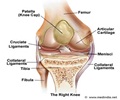Endomorphins are highly powerful a tool for pain management, just as morphine, a problematic narcotic derived from the opium poppy. It has previously been found that endomorphins are able to sidestep concerns of side effects by virtue of their hard-wired relationship to the body's own pain control receptors. Such receptors, known as u-opioids, appear to be highly sensitized to endomorphins, selectively drawing the natural analgesic to their target spots throughout the peripheral tissue of joints.
Recently a study, published in the October issue of Arthritis and Rheumatism, was conducted to determine whether peripheral administration of the endogenous - opioid peptide endomorphin 1 could reduce knee joint pain, using animal models of acute and chronic arthritis.Researchers from the University of Calgary, Alberta, Canada looked at the effect of endomorphin 1 on both acute and chronic arthritis in male lab rats. After inducing inflammation in their right knee joints, the researchers treated the rats with endomorphin 1 at various points following the onset of knee arthritis -- either 48 hours post-inflammation during the acute stage of joint pain, or at the one-week or three-week point during the chronic stage.
At all stages of treatment, the electrical activity, or firings, of knee nerve-endings in response to an exaggerated rotation of the joint were measured. Nerve-ending readings were also taken among rats that did not have arthritic knees but were nonetheless also treated with endomorphin.
The researchers found that endomorphin treatment caused nerve activity -- and presumably any related pain -- to drop off by approximately 75% in both normal rats and those with acute arthritis of the knee. However, when injected one or three weeks after the onset of arthritis, endomorphin had no effect on nerve activity. Subsequent autopsies further revealed that beginning one week after induced knee joint inflammation, the numbers and activity levels of some local u-opioid receptors had dropped below normal. At three weeks, all receptor activity levels dropped off significantly.
Immunohistochemical and real-time PCR analysis of the L3-L5 dorsal root ganglia ipsilateral to the chronic arthritis lesion revealed a reduction in -opioid receptor protein and gene expression compared with that in normal control animals.
The study concludes on the note that endomorphin, the morphine-like pain control agent, does not have any observable effect on reducing the sensitivity of arthritic joint nerves in the long run. The analgesic effect of endomorphin 1 is lost during chronic inflammation due to down-regulation of -opioid receptor expression in afferent nerve cell bodies. The therapy did, however, provoke a dramatic reduction in short-term joint hypersensitivity. These findings begin to explain the ambiguous efficacy of peripherally administered -opioid drugs in controlling chronic inflammatory joint pain.











